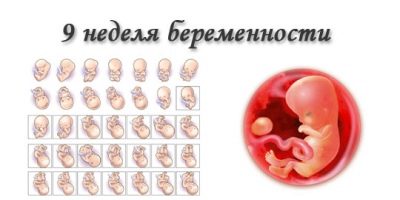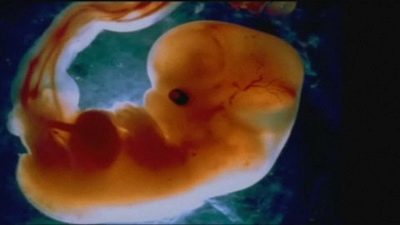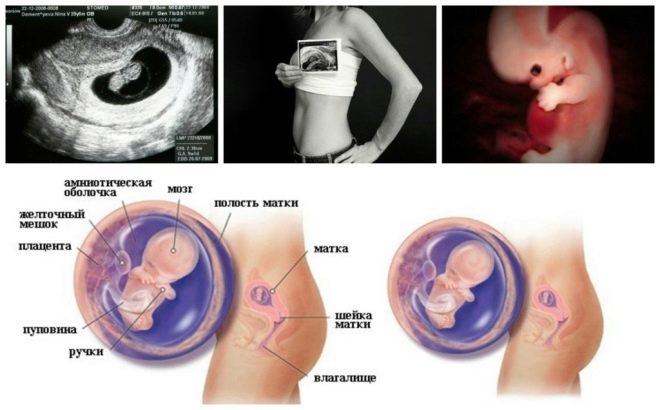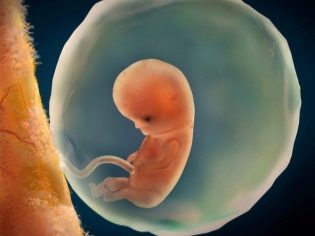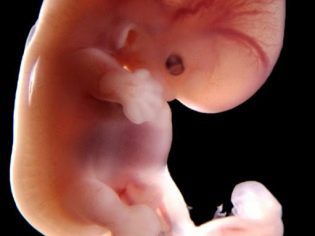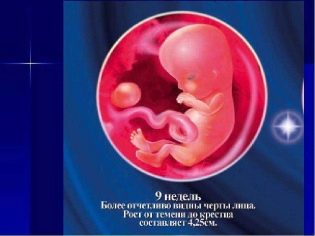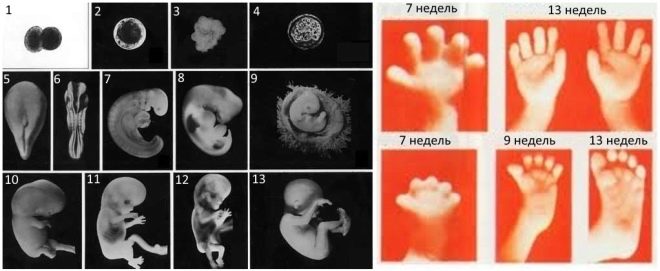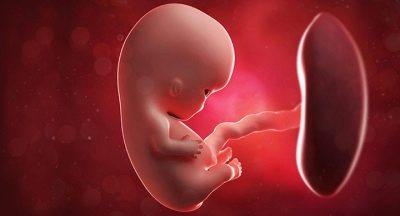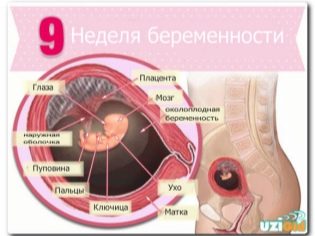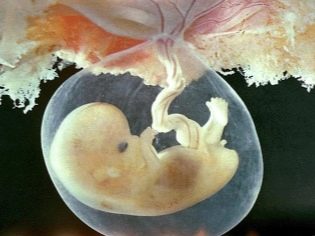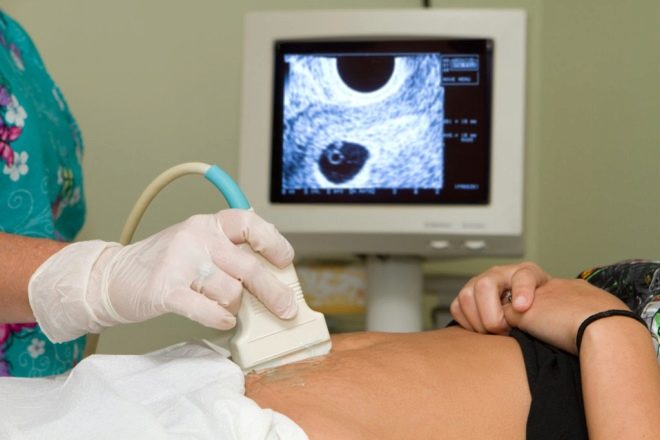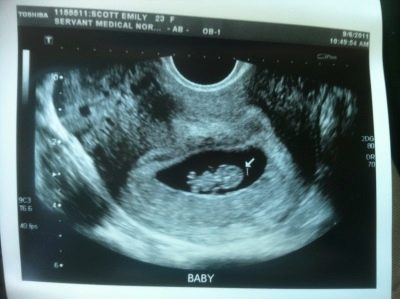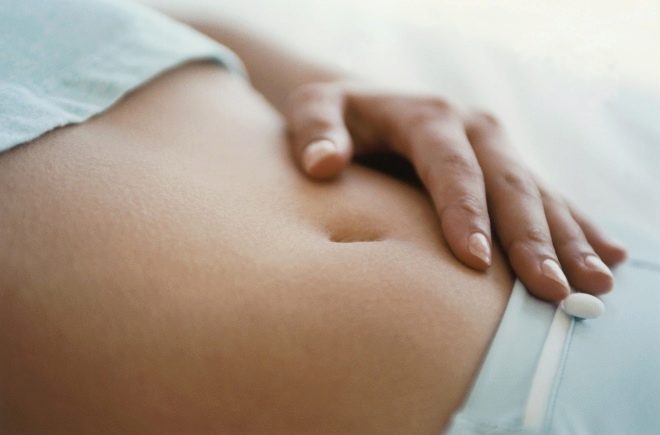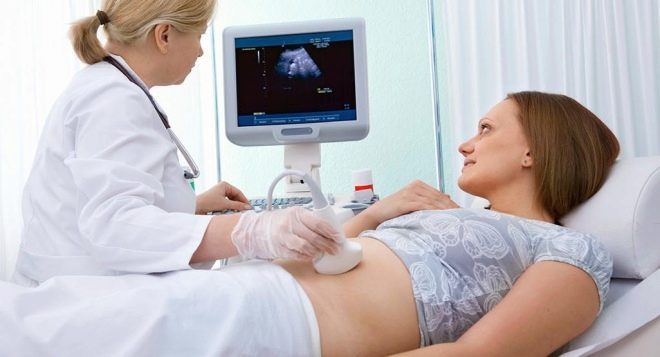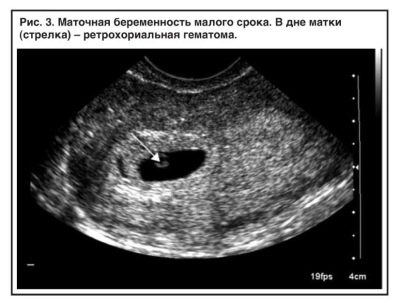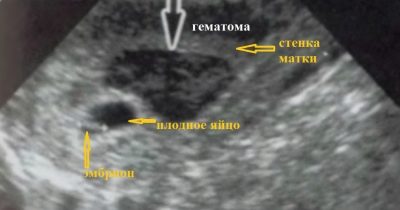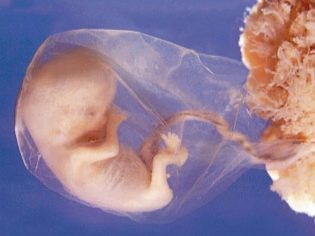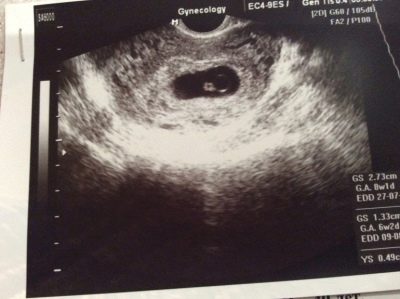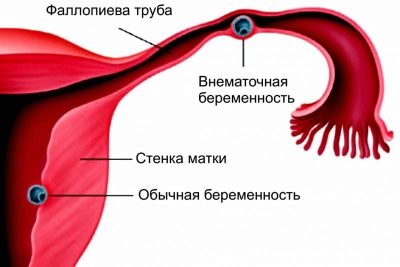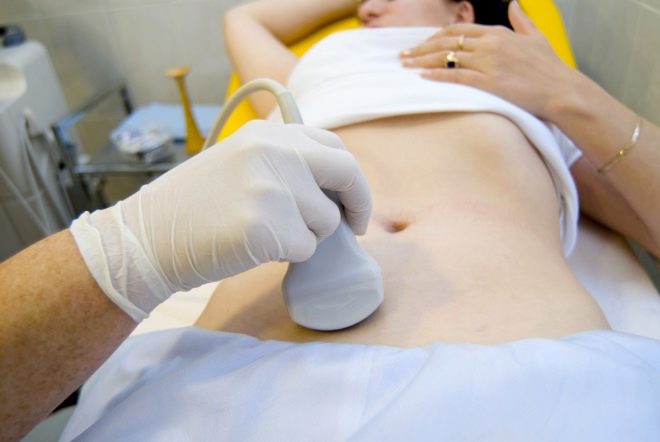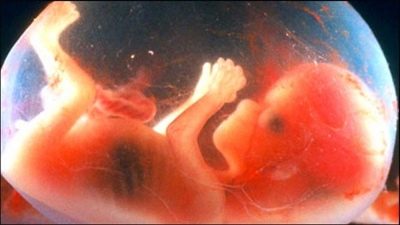9 week of pregnancy: what happens to the fetus and the expectant mother?
Begins the third month of pregnancy. There is no doubt about the condition of the mother: the woman has blossomed, many have become pregnant to face with this pregnancy, even if there is toxicosis. What happens to the baby and mother this week, we will tell in this material.
How many months is it
The 9th week of pregnancy means that two obstetric months, which last for 4 weeks, have ended, the third has begun. In total, the pregnancy lasts 10 obstetric months, and therefore even a third of this long and interesting journey has not yet been completed.
According to the world practice, obstetricians count the time of gestation not from conception, as women themselves do, but from the first day of the last menstruation. In other words, Obstetric differs from the actual period by about 2 weeks, because ovulation usually occurs in the middle of the cycle.
The 9th week of pregnancy according to obstetric standards is 7 weeks from the date of conception, the baby lives inside her mother's belly for a little more than a month and a half, and during that time he has changed a lot and has grown a lot. In order not to get confused in terms, a woman should understand that all medical documentation in consultation, all examinations, ultrasound examinations and tests are written out and carried out with indication of the obstetric period only. Now comes 8-9 weeks according to medical standards and 6-7 embryonic week.
If a woman has 9 weeks from the delay, then we are talking about a completely different period - these are 11 weeks from the date of conception and 13 obstetric weeks.
Baby development
The kid has grown noticeably. Now from the tailbone to the crown of his growth is about 20 mm, and it weighs more than 3 grams. The baby looks like a pea pod, because it has not yet got rid of the tail, which is peculiar to man in the period of embryonic development. After this week, the baby will officially change its status.
From conception to 9 weeks, it was considered an embryo, after 9 weeks it will officially be called a fetus, since the fetal period of pregnancy begins.
The embryo is trying very hard to get close to the human form, and this week it is actively unbending, ceasing to resemble a tadpole or a comma. Very soon the fetal tail will disappear.
Brain and nervous system
During this period, the brain is actively developing. His bookmark successfully passed earlier, and now begins a period of growth and establishment of functions. Some researchers claim that even now the baby is able to send impulses from its brain to the mother's nervous system. This is what some are trying to explain the change in appetite and food preferences of pregnant women.
However, official medicine does not have sufficient evidence of this process. This is only a hypothesis.But expectant mothers are not forbidden to fantasize a bit and imagine that it is the kid who makes her want a cake or piece of chalk.
This week the cerebellum is formed. It will depend on motor abilities, or rather their coherence and coordination. The pituitary gland is developing, soon this department of the brain will begin to actively participate in the process of developing the first independent hormones necessary for normal growth and development of the baby.
The child’s nervous system is already working, but its development does not stop for a second. This will continue the whole pregnancy, and then the process will continue after delivery. 8-9 weeks are extremely important for the proper development of the nervous system, since it is now that cranial nerves, cranial nerves and intervertebral nerve connections are formed.
Any failure in this process can lead to serious diseases of the central nervous system, so the expectant mother at this time should follow all the recommendations and protect your baby from any negative influences from the outside.
Internal organs
At week 9, the middle layer of the adrenal cortex is formed, which will take an active part in the synthesis of various hormones. The heart and blood vessels are already formed, they work. This week, the crumbs heart "acquires" interatrial septum.
The formation of almost all internal organs has been completed, and now there is a “debugging” of their work.
This week, the sex of the child has already been determined, the development of internal genital organs is in full swing, the formation of external genitals is beginning, but so far it is just a sexual hillock, which looks the same in boys and girls.
This week, the baby begins the formation of lymph nodes, begins the development of the mammary glands in children of both sexes. This week, the thyroid gland begins to work, the kidneys do not stand aside either - it already removes the liquid from the body of the crumbs.
Appearance of a child
The kid is becoming more and more human-like, but so far he looks somewhat strange. The embryo has a big head, small short hands, a small tummy.
The head is now the largest part of the body. The face begins to gradually acquire human traits, the baby ceases to be like an alien. At week 9, eyes begin to gradually converge, sliding closer to the center of the face. Short mouth begins to lengthen, sponges are formed. Already, the kid is trying to build faces, but so far, because of insufficiently developed facial muscles, this is not very good for him.
But on the 9th week he begins to appear like a neck, very soon the baby will get the opportunity to twist his head around. The formation of auricles continues, this week ear lobes are actively laid.
At this time, limbs begin to lengthen, fingers grow on the handles. The hands themselves acquire elbows, and the lower extremities acquire quite similar to the real feet. Fingernails, or rather, their types, are formed this week, but not on the fingers, on the palms and on the feet, they will gradually “move out” to the proper place.
The formation of the muscular system continues, bones begin to grow stronger, and now there is a need for a sufficient content of calcium in the blood of the future mother. The shoulders and forearms stood out, the volume of the chest and abdominal cavities increased, the heart no longer bulges.
What can do baby?
This week the main achievement is the ability to write. Now the baby swallows the amniotic fluid and with enviable regularity empties the bladder. No need to worry - the water retains its sterility, as it is updated every 3-4 hours.
By the way, about swallowing should be said separately. During this period, the baby has learned to swallow to perfection, since the swallowing reflex is one of the first to be formed in humans in the embryonic period.
At 8-9 obstetric week, the child is able to move the limbs, although such movements still resemble chaotic strokes, the nervous system and the brain can not yet coordinate motor functions.
Placenta
The “baby seat” replaces the chorion, and this week the placenta begins to gradually take over the functions of the corpus luteum, which has not yet ceased its activities. The young placenta gradually begins to bind the maternal organism and the organism of the crumbs. The umbilical cord becomes longer and thicker.
Your baby on ultrasound
An ultrasound scan is not usually prescribed at week 9, since there is still time before the first screening study. But there may be various indications for diagnosis, in addition, today, any pregnant woman can make an ultrasound scan at a paid clinic just to see what the baby has become and how old it is.
Medical indications for ultrasound scanning at this time are as follows:
- pregnancy pathology;
- discrepancy between the size of the uterus when inspected obstetric period;
- specification of the period of pregnancy and the number of fruits;
- monitoring the development of pregnancy after IVF.
The doctor of ultrasound diagnostics at this time, if the resolution of the device and the circumstances allow, will be able to show the mother the first movements of the baby, which she cannot yet feel - the baby is small, in the womb he is free. At this time, the basic parameters are measured, which make it possible to judge the proper development of the child. These parameters include the SVD - the average internal diameter of the ovum and the CTE - the coccyx-parietal size.
What they should be normal - a difficult question, because each pregnancy is unique in its own way. On average, the rules are as follows.
The average internal diameter of the ovum on the 9th obstetric week of pregnancy
The size of the ovum by ultrasound, mm | Deadline (week + day) |
28 | 8 weeks + 1 day |
29 | 8 weeks + 2 days |
30 | 8 weeks + 3 days |
31 | 8 weeks + 4 days |
32 | 8 weeks + 5 days |
33 | 8 weeks + 6 days |
35 | 9 weeks exactly |
KTR - a table by the day of the 9th week of pregnancy:
Coccyx parietal size (mm) | Obstetric term (week + day) |
17 | 8 +1 |
18 | 8+2 |
19 | 8+3 |
20 | 8+4 |
21 | 8+5 |
22 | 8+6 |
23 | 9 weeks exactly |
Heart rate, that is, the heart rate, this week is perfectly audible during an ultrasound scan. On average, it is 175 beats per minute. However, different options are possible - the indicators from 155 to 195 beats of a small heart per minute of time are considered normal.
It is still difficult to measure the arms, legs and head - the baby is so tiny that the scanner cannot grasp the exact parameters of the limbs or individual parts of the body.
The sex of the child cannot be seen at this time. Sexual tubercles are identical in boys and girls. To find out the appearance of a child of what sex should be expected, it is better to go to the ultrasound room later - after about 16 weeks of gestation, how the external genitals will be formed completely, and the boys' scrotum will differ markedly from the girl's labia.
What does mom feel?
At obstetric week, the feelings of expectant mothers can vary significantly. Some have a toxicosis with all the "charms" of this state, while others flutter and feel great. At this time, hormone progesterone “controls” everyone. It is produced in large quantities for the sake of preserving the baby’s life - it creates suitable conditions for its development and to some extent inhibits maternal immunity so that it does not reject the fetus as half a genetically alien object.
Under the action of progesterone, a global restructuring of the entire body begins after conception. By the 9th week of pregnancy, the symptoms and signs of pregnancy are obvious.
Monthly absences, a woman's appetite increases, in the evenings a slight temperature may rise, from which by the morning there is no trace.
All the processes that occur in the body of a woman, now take a fair amount of energy, energy reserves and potential depleted. Therefore, a woman can feel tired and broken right in the morning. She gets tired faster, performing normal daily work, she almost always wants to sleep.
Sometimes dizzy, some sick, and from the smells and tastes that previously liked or were tolerant. In the evenings, many have a headache. Constipation and loose stools may occur. All this is a side effect of progesterone, which ensures the normal development of pregnancy.
If a woman in this period is tormented by severe toxemia, there is little left to endure - closer to weeks 12-13, symptoms of early toxicosis usually subside.
If now the breast is sore, then you should also be patient - all the major changes in the structure of the mammary gland, which is preparing to feed the infant, proceed mainly in the first three months of pregnancy, then it will be somewhat easier.
Many women at this time say that their breasts have increased by about 1.5-2 sizes, which their husbands usually appreciate. The size of the uterus is now doubled from the initial state, its weight is about 100 grams for women who are going to become mothers for the first time, and about 200 grams for those who decided to give birth to the second, third or next child.
Feeling at the beginning of week 9 may be darkened by the appearance of a cold. In fact, nasal congestion in this period almost never has to do with colds, acute respiratory viral infections, acute respiratory infections, or other diseases. In the absence of other symptoms of these ailments, we are talking about the physiological rhinitis of pregnant women.
The mucous membranes swell due to the accumulation of fluid in the body, resulting in nasal breathing is disturbed. This is also a consequence of the work of progesterone, and there is no need to treat such a runny nose. If the nose does not breathe at all, you should consult with your doctor.
Due to illness, nasal congestion, many pregnant women can not sleep. The paradox of the 9th week is that the woman really wants to sleep during the day, but with the arrival of night the dream does not come, no matter how the expectant mother tries to count the sheep and lambs. This is a temporary phenomenon, mostly hormonal. A little later, the situation stabilizes.
Externally, pregnancy is not yet objectively visible.. Only a very careful look will be able to determine the increase in waist in girth and breast size. However, in the appearance of the future mother, something elusive appears on this term, some mystery and spirituality appear in the form of a woman, her eyes sparkle, many say that they have become more beautiful and attractive.
Changes in the body
Inside the woman, there are cardinal changes. The level of the hormone that is produced by the cells of the chorion continues to increase. It was he who, at the beginning of pregnancy, allowed her to establish her fact - hCG at a certain concentration “stains” the second strip on the test, and is also determined in the analysis of venous blood.
Now the level of hCG is not yet the maximum, it will reach its peak by 12-13 weeks of pregnancy, and then gradually begin to decline.
The uterus is already starting to be felt. It is similar in size to a good grapefruit. In any case, on examination by a gynecologist there will be no doubt - the pregnant uterus is already noticeably different from the non-pregnant. Many women under the influence of hormones begin to smooth the skin, it becomes more clean, beautiful, well-groomed. Dark pigment spots may appear on the nipples.
If in the first two months the expectant mother often ran to the toilet for a small need, then from 9 weeks urge to urinate becomes more rare, which is perceived by women as a significant relief. In connection with the formation of the placenta, the volume of blood circulating in the body increases, this causes the mother’s kidneys, heart, vessels and liver to work in a strengthened mode. therefore even insignificant physical exertion can cause rapid heartbeat, shortness of breath.
The body, under the “order” of progesterone, began storing up fat for the future, which is a source of energy for the female body and the growing baby. In addition, the fat deposits on the stomach, waist, hips are very upset by many slender girls, who state that the waist has already increased by 3-4 centimeters, and there is a 2-3 centimeter increase in the hips.
The baby now needs a sufficient amount of liquid, and he will take it from the mother's body.
The skin and hair of pregnant women at week 9 may become drier. This week there is a risk of developing anemia.
Allotment
The amount of discharge this week remains, as it was a week earlier, increased. Vaginal secretions are produced more because of the hormonal adjustment that the entire female body is going through. Normally, they are transparent, bright, let's say a light yellowish color. Healthy discharge from uncomplicated pregnancy at week 9 is odorless, foreign inclusions, impurities.
Disturbing signs are the discharge pink, orange, with blood impurities. They can talk about the threat of miscarriage, problems with the cervix (erosion, for example). Similarly, the secret is estimated, which has a brown color, and smears.
Green and brown discharge with an unpleasant odor may indicate the presence of infection, including sexual. Infection of the fetus, the development of miscarriage can be avoided if in time to consult a doctor with complaints about atypical for this period of discharge.
The appearance of itching simultaneously with thick white secretions that have the consistency of cottage cheese, smelling yeast or sour milk, may indicate that a woman has thrush. This disease is a frequent companion of pregnancy. Be sure to consult with your doctor about the methods of treatment and medications allowed for pregnant women.
Since each woman’s pregnancy is rather individual, the discharge can be quite specific. For one woman, a pinkish discharge will be the norm, while for the other they will become possible with pathology.
All secretions, except bright, are evaluated by quantity, smell and associated symptoms. If they do not bother a woman, she doesn’t hurt anything, then in some cases daub is just an individual feature. But to answer the question, the norm or pathology, should the doctor, who will rely on the diagnostic data, history and results of tests of a particular woman.
If blood has suddenly gone, it doesn’t foretell anything good, since in 99% of cases it indicates a high probability of miscarriage, a miscarriage that has begun, the so-called recurring miscarriage. In this situation, a woman should go to the hospital as soon as possible. It is advisable not to waste time and call the "ambulance."
In about 60% of cases of bleeding at this period of gestation with timely and proper medical care, pregnancy can be maintained.
Pains
Different intensity of pain in the abdomen at this time is not the norm. The uterus is not so big as to exert pressure on the neighboring organs, and it is still far from giving birth, so that the pain was caused by pelvic expansion and muscle preparation. therefore any abdominal pain at such an early date should not be overlooked. You should definitely tell your doctor about it, because often the pulling pains precede miscarriage.
A stomach ache may also be due to digestive problems. Constipation, diarrhea, increased flatulence, which may occur during this period, does not contribute to a painless stomach. To distinguish the pain that occurs when the threat of spontaneous abortion, from the pain inherent in indigestion, you need to carefully listen to the nature of the pain:
- With the threat of termination of pregnancy, they are pulling, aching, almost constant, giving in the lower back, accompanied by abnormal discharge.
- In digestive disorders, pain is more abrupt and short-lived, it is localized only in the abdominal region, mainly in the upper abdomen. Pathological secretions are not observed.
This week, a woman may begin to feel a back ache. This is not surprising. All the same pregnancy hormone - progesterone - causes softening of muscles and ligaments, in connection with which pain and aches may appear. The abdomen is still small and the center of gravity is not shifted, but in the evening a woman can feel aching pain in the lower back.
Pain in the beginning of the third month of pregnancy in the back and lower back can be an exacerbation of chronic, previous illnesses, such as kidney disease or osteochondrosis. The reason is that the woman's body already at the initial stage of carrying a baby is under serious strain, at which those organs and systems in which there were "malfunctions" are the first to "surrender".
Headaches at week 9 indicate that the amount of blood has increased, and the pressure on the walls of blood vessels has increased slightly. This type of pain is especially noticeable in women who have a tendency to hypertension - high blood pressure.
If you experience headaches, you should begin to control the level of blood pressure.
The pressure is measured on two hands in turns, the facts of the increase can not be concealed - the doctor should know that a woman has the likelihood of developing preeclampsia - a state of danger for both the baby and the woman.
Frightening pregnant women at 9 weeks is not only the presence of pain, but also its absence. For example, in a situation if the chest suddenly stopped hurting and the signs of pregnancy disappeared, which were a day ago. In this case, we can talk about a non-developing, missed abortion. If the fetus has died, the woman's body ceases to develop according to the "pregnant scenario." You need to do an ultrasound and make sure that the baby is alive.
Sometimes the disappearance of nausea, aches and drowsiness, as well as chest pain, says only that the time of toxemia and breast remodeling is over. Now pregnancy will proceed easily and naturally, at least until the third trimester.
Possible problems
The first trimester of pregnancy, which includes week 9 by obstetric standards, is considered the most dangerous from the point of view of preserving the baby. The crumb is still so weak and vulnerable that anything can affect it negatively - from a woman's health condition to environmental and psychological factors.
According to medical statistics, most miscarriages occur in the first three months of gestation. Although the range of problems that may lie in wait for the future mother and her baby at this time is not limited only to the threat of spontaneous abortion. Details below.
Retrochorial hematoma
There is such a pathology to one degree or another in every fourth pregnant woman for up to 11-12 weeks. Retrochorial hematoma is the accumulation of blood between the chorion and the fetal membranes if there is a small detachment.
The most common pathology occurs in women who suffer from infectious diseases, inflammatory diseases of the reproductive system, working in hazardous industries, where there is exposure to strong vibration. Hematoma can also be caused by various diseases of the endocrine system, autoimmune diseases in which the mother's body produces antibodies against the fetus.
Retrochorial hematoma is often observed in women experiencing severe stresses in the early period, as well as in women who perform quite hard physical work. (lift weights, for example). To hematoma can lead to smoking and alcohol intake, as well as severe toxicosis, if it has a woman's place.
In a mild form, the pathology is asymptomatic, the future mother will know about the presence of such a hematoma only during the ultrasound. More extensive and serious hematoma is characterized by cinnamon daub from the genitals.
Hematoma is a great danger for the preservation of pregnancy. If blood is replaced by brown secretions, experts recommend that you urgently go to the hospital to eliminate the likelihood of sudden growth and an increase in hematoma, extensive detachment and death of the baby in utero.
Treatment is most often aimed at stopping the growth of hematoma and its resorption. It can be inpatient or outpatient - it all depends on the size of the hematoma and the degree of threat to bear the child.
Risk of miscarriage
Up to 70% of pregnant women in one degree or another face the threat of abortion at an early period, in most cases it is possible to preserve the pregnancy if the causes of the threatening condition are not associated with genetic disorders in the baby. Unfortunately, with chromosomal anomalies, when the fetus is not viable, nature itself conducts natural selection. Medicine in this matter is powerless.
Among other reasons for which the threat can develop at the 9th week of pregnancy are a history of miscarriages, a woman’s age (the older the expectant mother is, the more likely an adverse outcome), smoking, severe and prolonged stress, taking certain medications, caffeine, exposure to an adverse environmental background. , chronic diseases of women, including gynecological profile. The probability of miscarriage is increased if the previous pregnancy ended in abortion.
After IVF, the probability of miscarriage at 8-9 weeks of pregnancy is approximately 24%, with early Rhesus conflict, this probability rises to 60%. Modern medicine has many ways to preserve a pregnancy if a woman timely requests help.
Symptoms of threat are nagging pains, atypical discharge, mainly with the presence of blood or ichor. Self-medication is unacceptable here.
Undeveloped pregnancy
This pathology is also called a failed miscarriage, because the baby, who for some reason stopped growing and died, still remains in the uterine cavity for some time, and the woman may have no idea what happened irreparable. It can happen at any time. but the most dangerous in terms of the likelihood of fetal death are three periods: 3-4 weeks, 8-10 weeks and 16-18 weeks. Thus, the 9th obstetric week enters a period of increased risk, and the woman should be very attentive to her well-being.
The most common cause of this pathology is genetic disorders - the baby inherited an extra chromosome in one of the pairs, or a pathological mutated gene has formed in it. Very often, such children are not just not viable, but they cannot grow and develop normally even while they are in the womb. That is why the embryo after cleaning the uterus is taken for genetic research.
The data obtained will help the couple in the future to plan pregnancy, taking into account the probability of genetic disorders. The geneticist will help them with this.
The second most common reason for fetal death, stopping its development is infectious diseases in mom. It can be both genital infections and TORCH infections. Sometimes in the pathology there is a share of "guilt" and a partner of a woman, so, with teratozoospermia (violation of the morphological properties of spermatozoa), pregnancy can occur, but it ends with an overwhelming miscarriage in the early period. Influence on the fetus can mom travel on this period, if they are associated with a sharp climate change, as well as bad habits.
The chances of fetal death are higher in women who have undergone several abortions before.
Pathology is usually detected on ultrasound, because the doctor does not see signs of fetal life.Obstetricians and gynecologists are often the first to “find” a non-developing pregnancy, since the uterus is noticeably lagging behind the expected period. If the survey was not conducted, then the first symptoms may be bloody brown discharge, pulling back pain characteristic of a miscarriage, because after 2-4 weeks after fading the fetus begins to reject.
There is no treatment, the uterus is subject to curettage. Antibiotics are prescribed. The next pregnancy should be planned together with the doctor, much depends on the reasons that led to the death of the baby.
Ectopic pregnancy
It is said about such a pathology when the fertilized egg is fixed not in the uterus, but outside of it - in the neck or in the tube. Such a pregnancy is doomed to be interrupted by surgery, since the child cannot grow normally and develop outside the uterus, and the risk of death of the woman increases, for example, due to rupture of the uterine tube under the influence of a growing embryo.
It is possible to detect such pathology at week 9 only if an ultrasound examination was not performed before and there was no examination by a gynecologist. Some women, having made the test in the first days of the delay, and having made sure that there are two stripes on it, are in no hurry to get up in the consultation for registration. They have a higher risk of late detection of ectopic pregnancy. When referring to a doctor, for example, at 8-9 weeks, the uterus will not meet the deadline in size, the doctor will immediately refer the woman to the ultrasound, and the diagnostician-somnologist will not be able to detect the fetal egg in her.
By week 9, an ectopic pregnancy may already have its own symptoms - fever, pain in the shoulder, especially when a woman takes a horizontal position, nausea, diarrhea and abdominal pain - in the right side or in the left (it all depends on the specific place of attachment of the ovum) , the appearance of bleeding from the genitals.
Sharp pain, cutting, which is difficult to endure, with simultaneous pressure on the rectum and a keen desire to empty the bowels right now can, at week 9, indicate that a fallopian tube has ruptured. A woman needs emergency surgical care, her life is in danger.
Modern methods of surgical response in most cases allow you to save the tube (except for the gap), the probability of getting pregnant again and successfully endure the baby is great.
The most unfavorable prognosis is a cervical pregnancy, when the ovum is fastened in the cervix. In this case, most often you have to remove the entire reproductive organ completely.
Intrauterine growth retardation
Typically, such a diagnosis is established on more significant periods of pregnancy, when the doctor with the help of an ultrasound scan can measure various parameters of the baby’s body. At 9 weeks of pregnancy, the diagnosis may also sound, but only if it is a question of the true primary delay in the development of the baby. Usually it is associated with gross pathologies of the embryo, and prognosis is unfavorable.
In other words, if the child is 20 weeks behind ultrasound from the norms for a given period of 1-2 weeks, they say about intrauterine growth retardation of the first degree, if for 3 weeks - then about the second degree. And at week 9, the fact itself can be diagnosed without specifying degrees.
Example: at the 9th week of pregnancy, the KTR of the fetus and the size of the ovum correspond to only 6-7 weeks, while the timing of pregnancy is known for sure, there can be no error, and the fetus shows signs of vital activity, that is, it continues to develop. There may be another option - the fetal egg will correspond to the term of gestation, and the fetal CTP will significantly lag behind.
Anyway developmental delay of the baby requires an individual approach on the part of doctors. The most common causes lie in the chromosomal and non-chromosomal anomalies, in which life in the baby is preserved, but the multiple malformations of the internal organs prevent it from eating normally, growing, and developing.
About 20% of children with symptoms of delayed development identified early are born dead or die within a few hours or days after their birth.
Other causes include negative environmental factors, mother’s diseases, infections, her bad habits, and insufficient nutrition. With such reasons, doctors can help by starting to inject a woman with vitamins, drugs, and uteroplacental blood flow improves. The baby will be able to grow them to the desired size.
Anembrionia
This pathology inflicts a strong moral and psychological trauma on a woman if she is found to last for 8-9 weeks. After the test, enough time passed, the woman managed to get used to the thought of the future child, she might have already come up with a name, looked after the stroller, chose booties and a suit for discharge. How unexpected and traumatic the doctor's verdict may be that there is no trace of an embryo!
This is usually, like an ectopic pregnancy, at this time found in women with the initial treatment of the expectant mother to the doctor at week 9. Ultrasound shows the growth of the ovum, but the embryo is really not there. Such a pregnancy is a type of non-developing pregnancy in which implantation was successful, but the embryo did not develop.
The causes of a strange phenomenon almost always lie in genetic disorder - an extra chromosome, a mutated gene, etc. Sometimes at the earliest time, immediately after implantation, the woman is exposed to radiation, poisons, toxins, is under severe stress, takes illicit drugs, smokes, and for unknown reasons, her hormones change dramatically. At week 9, if anembryonia is detected, it is most likely that it is no longer possible to establish the true causes.
A woman will undergo surgical curettage, a subsequent anti-inflammatory treatment, after which, with the permission of the doctor, you can try to get pregnant again.
Cold, flu, ORVI
Against the background of reduced immunity, which is suppressed by the hormones of pregnancy in order to save the life of a small man growing inside his mother, many women fall ill at this time. If the expectant mother has a viral infection, for example, flu or ARVI, Be sure to call the doctor at home and inform him about your "interesting" situation. After the prescribed treatment, it is imperative to monitor the ultrasound, to make sure that the crumb is okay.
An early miscarriage, a missed abortion is triggered not by the virus itself, but by the high fever associated with the illness, improper treatment with the ingestion of prohibited drugs.
The common cold does not need special treatment. Enough to observe peace, take sick leave, lie down and drink warm tea with cranberries. See doctor is desirable in this case.
Surveys and analyzes
If a woman is registered earlier, then she does not expect any special examinations at the 9th week of pregnancy. If it is for this week that a visit to the consultation is scheduled for registration at the dispensary, a woman will receive a large list of referrals for various tests.
Blood for general and biochemical analysis, general urinalysis, coagulogram (blood clotting assay), blood is taken from the vagina and scraped from the cervix, colposcopy is performed (examination of the cervix with a colposcope).
In addition, women take blood for infections, including sexually transmitted infections, for hepatitis B and C, syphilis, HIV status and TORCH infections. According to individual indications, they can conduct an ultrasound scan, take blood for hormones, determine the level of hCG.
The latter may be needed to confirm a multiple pregnancy, to exclude or confirm the fact of a non-developing pregnancy, the threat of miscarriage.
When carrying twins, the concentration of the hormone is 2 times higher, and in all threatening conditions and the death of the baby in the womb - significantly lower than normal.
Recommendations to expectant mothers
Taking out and giving birth to a healthy baby will help recommendations, following which at the 9th week of pregnancy will help avoid unpleasant complications of pregnancy.
Nutrition
Even if a woman has toxicity, this is not a reason for this period only, for example, cucumbers. Food in any case should be balanced and correct, because digestive problems against the backdrop of raging progesterone are exacerbated by the mistakes in the preparation of the diet.
It is recommended to eat at this time at least 6 times a day in small portions, making an extreme meal no less than 2.5 hours before bedtime.
Carbonated drinks, coffee, strong tea, cold cuts, melted cheeses, sausages, lard, fried pork chops, smoked fish and canned food should be ruthlessly thrown out of the fridge so that no temptations arise.
Fresh vegetables and fruits, lean meat (veal, beef, rabbit, turkey, chicken), cereals, greens, vegetable oil, whole-grain bread (in small quantities) should replace them. Such a menu will allow the baby to receive everything necessary for her growth and development from maternal blood, and the woman herself will become noticeably easier - diarrhea and constipation will stop, the stool will return to normal, and nausea will decrease.
You should discuss with your doctor the possibility of taking multivitamins for pregnant women. Soon the baby will have an increased need for calcium, magnesium, phosphorus, now there is a need for a large amount of folic acid. Depending on the season, season, region of residence, vitamins can be assigned from the earliest dates. If a woman does not accept them yet, it’s time to ask your doctor.
clothing
Regardless of the time of year, the clothes worn by a woman at an early period should be sewn of natural fabrics, her skin should not overheat and sweat (synthetics contribute as well as possible).
At week 9, you may have to change the bra. It's time to replace the usual model for a special bra for pregnant women with a wide "belt" and a more fixed support for the mammary glands.
Daily regime
Until maternity leave is still very far away, and a woman can not skip work and study. Therefore, it is in her interest right now to establish for herself the most optimal mode of the day. If night sleep is disturbed, it should be in consultation with the doctor to start taking light sedatives on a plant-based basis, which have a sedative effect. (motherwort, valerian tablets). This will allow a woman to calm down and survive the difficult hormonal "riots" with the least loss.
If the opportunity allows, you can relax during the day, but not to the detriment of night sleep. It is during a night's sleep in the body, many hormones and enzymes are produced, protein substances necessary to ensure normal functioning.
Sex
Sex at week 9 is not contraindicated if there is no threat of abortion. Moreover, most women emphasize that sexual desires are at their peak at this time. This is quite understandable - the abdomen is not there yet, nothing confuses partners and does not cause anxiety, the need to be protected or, conversely, to “catch” ovulation, also disappeared.
Now is the time to relax and enjoy full, harmonious intimate relationships.
In addition to the obvious benefits for the body, there is sex from this period and benefits for the psychological mood of the pregnant woman - the woman becomes more balanced, calm, harmonious.
Precautionary measures
A woman should give up bad habits and make sure that they are as far away as possible from closed smoking rooms. Passive smoking causes irreparable harm to the baby, who is now undergoing the most important processes of formation of organs and systems.
If week 9 falls on the season of mass incidence of influenza or ARVI, you should not visit crowded places.Women whose work is associated with communication with many people during the peak of the incidence should contact a doctor to give a sick leave to spend this time at home safe. Many doctors are happy to take such a measure, because they understand that it is better to warn than to treat the patient at risk to the mother and the child.
Walking in the fresh air is useful and necessary at this time regardless of the season, weather. Baby needs oxygen. He gets it with his mother's blood, and his mother can enrich his blood with oxygen, taking walks and eating oxygen cocktails.
Reviews future moms
Future moms about their 9 week of pregnancy in various forums on the Internet have left very different reviews. Some suffered at this time from the strongest toxicosis, others enjoyed their new position. Some mothers at this period started a “pregnancy diary” in which they recorded general data for each day - their weight, pressure, basal temperature level, a detailed description of all the alarming symptoms.
Such diaries are recommended by obstetricians themselves, because the records of the woman between planned appointments allow the doctor to evaluate not only the changes that have occurred since the last visit of the pregnant woman, but also to see possible complications, some features of the pregnancy that appeared between visits.
About what happens on the 9th week of pregnancy, you can see in the next video.


